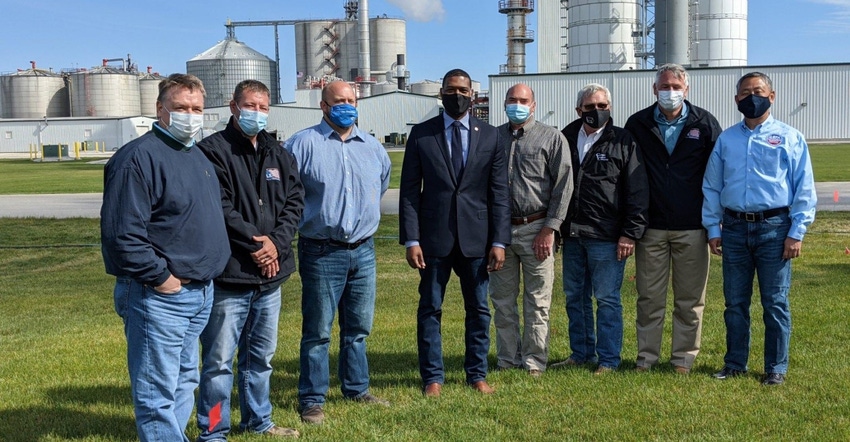Calls come for Biden’s climate plan to include biofuels as part of net-zero carbon strategy.

As part of his trip to Iowa on Tuesday, U.S. EPA Administrator Michael Regan toured Lincolnway Energy, an ethanol plant near Nevada, and led a roundtable discussion of Iowa farmers and biofuel producers.
Iowa Corn Growers Association President Carl Jardon represented corn farmers at the in-person, on-farm meeting with Regan and Secretary of Agriculture Tom Vilsack. Jardon thanked Regan and Vilsack for prioritizing this Iowa farm visit and providing the opportunity to speak about advancements in farming practices that are driving lower carbon biofuels.
In a tweet, Regan says, "Our agricultural community must have a seat at the table if we are to successfully tackle the climate crisis."
In Iowa today meeting with a group of Ag & Energy leaders alongside @SecVilsack.
— Michael Regan, U.S. EPA (@EPAMichaelRegan) May 4, 2021
Especially enjoyed meeting with a great group of young Ag leaders from @iowaffa!
Our Agricultural community must have a seat at the table if we are to successfully tackle the climate crisis. pic.twitter.com/xXItFI0Aqi
“Carbon sequestration is a top federal policy priority for ICGA members as incentivizing farmers’ voluntary improvements in ag production practices and opportunities to credit soil carbon sequestration will continue to lower the carbon footprint of biofuels,” Jardon says. “Biofuels, like ethanol, are an immediate, effective, and affordable pathway for agriculture and rural America to help combat climate change.”
Iowa Renewable Fuels Association Executive Director Monte Shaw adds, “Today, Mr. Regan heard a loud and clear message: biofuels are way more than a transition fuel; biofuels are the net-carbon-negative fuel of the future.”
Thank you @EPAMichaelRegan for making Iowa your 1st stop out of DC to learn about the contribution #biofuels and ag can make in a clean energy future! https://t.co/Eovlj728pP pic.twitter.com/4sbRcXlZk2
— Iowa RFA (@iowafuel) May 4, 2021
Shaw notes that improved production practices at both the farm and plant levels combined with carbon sequestration technologies preparing to be deployed can make biofuels like ethanol and biodiesel net carbon negative over the next decade. “That’s something that wind and solar can never achieve,” Shaw explains.
“Any plan to significantly reduce carbon emissions over the next decade must include biofuels and it is our hope after his visit today Administrator Regan will confidently carry that message back to policy makers in D.C.,” Shaw notes.
IRFA President (and CEO of Southwest Iowa Renewable Energy) Mike Jerke talks to @EPAMichaelRegan and @usda Sec Tom Vilsack about path to net zero carbon biofuels. And enforcing RFS, keeping E15 a year-round option, and moving to higher blends. pic.twitter.com/IHFQ7uTcPo
— Iowa RFA (@iowafuel) May 4, 2021
In an editorial published in the Ames Tribune on the day of his visit, Rep. Randy Feenstra says he was pleased to see Regan visit his district to learn more about the role biofuels can play in climate mitigation.
Feenstra notes that Regan can take action immediately to support the biofuels industry -- beginning with ensuring biofuels are included in any infrastructure and climate discussions. “Right now, the Biden administration’s $2 trillion proposal would spend $174 billion to subsidize electric vehicles while hardly even mentioning the biofuel industry,” Feenstra writes.
Feenstra says the proposal also ignores the fact that biofuels can provide immediate carbon reduction when it comes to the transportation sector. He cited a recent study from Harvard University and Tufts University which found that ethanol reduces greenhouse gas emissions by 46%.
“It is estimated that biofuels use has already reduced emissions by nearly one billion metric tons, according to a separate study conducted by Life Cycle Associates. In other words, further emission reductions can be achieved by bolstering the production of biofuels, as opposed to moving in the opposite direction and incentivizing electric powered vehicles,” Feenstra says.
Feenstra did applaud the actions taken by EPA in supporting the biofuels industry with actions on denying small refinery exemptions under the Renewable Fuel Standard. He says EPA should continue to do more in promoting a strong RFS and work towards blending higher levels of biofuels moving forward.
“Come 2023, there will no longer be a statutory RFS requirement, and the EPA will begin setting the standard. Committing to a strong RFS would send a clear message that biofuels are here to stay and will play a critical role in decarbonization efforts and in the future of energy production,” Feenstra writes.
“Additionally, as we look to the future of the biofuels industry, it is imperative that the EPA approve new pathways for renewable fuels so we can continue advancing biofuels technology and infrastructure,” Feenstra concludes.
About the Author(s)
You May Also Like


.png?width=300&auto=webp&quality=80&disable=upscale)
.png?width=300&auto=webp&quality=80&disable=upscale)

